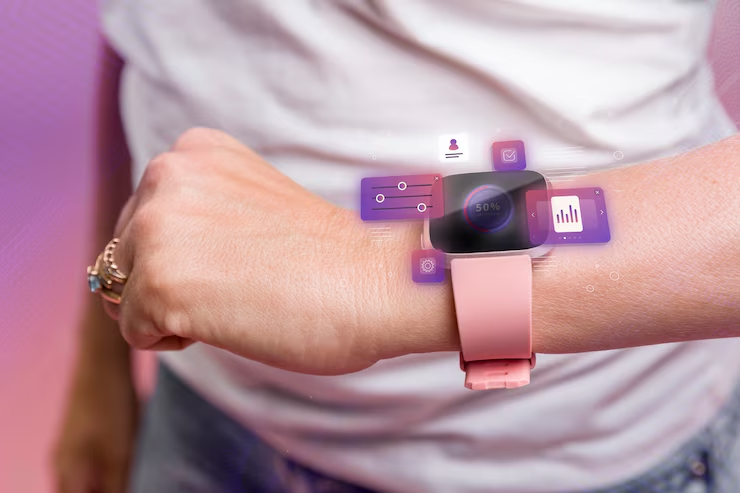Qofib brings a fresh perspective on Wearable Tech Innovations and Health Tracking, one of the most exciting evolutions in modern health and personal technology. These devices are no longer just accessories. They now act as real-time health partners, helping users gain control over their physical well-being, track performance, and stay alert to bodily changes that matter.
Wearable Tech Innovations and Health Tracking have transformed the way people monitor their health daily. With sleek designs and smarter features, wearables now provide detailed insights into heart rate, sleep patterns, oxygen levels, fitness goals, and even early signs of medical issues. The power to understand and manage health is now right on your wrist.
1. The Rise of Smart Health Wearables in Daily Life
The demand for wearable technology continues to grow. Fitness bands, smartwatches, and even smart rings are now part of everyday life. These devices do more than count steps. They analyze physical activity, measure heart rate variability, and remind users to stay active. For many, wearable tech acts as a digital health coach offering instant feedback. Users depend on these tools for motivation, structure, and a deeper awareness of personal health behavior.
2. Advanced Health Metrics for Preventive Care
Modern wearable devices are pushing boundaries by monitoring blood oxygen saturation, ECG readings, skin temperature, and sleep cycles with impressive accuracy. These features allow users to spot irregularities early. Wearable Tech Innovations and Health Tracking help individuals respond faster to potential issues. Data generated through wearables can be shared with healthcare providers to build a more complete picture of health, allowing preventive care to take center stage.
3. Integration with Mobile Health Ecosystems
Wearables are now central to digital health platforms. They sync seamlessly with mobile apps and cloud systems to provide personalized reports. Whether using Apple Health, Google Fit, or proprietary apps, users receive visuals and summaries that make data easy to understand. Wearable Tech Innovations and Health Tracking deliver tailored recommendations based on trends and patterns. This integration allows for smarter goal-setting and sustained improvements over time.
4. Real-Time Monitoring for Chronic Conditions
People managing diabetes, heart disease, or hypertension benefit greatly from wearable technology. Glucose monitors, heart rhythm sensors, and blood pressure trackers offer real-time updates. This reduces dependency on traditional checkups and improves daily decision-making. Wearable Tech Innovations and Health Tracking contribute to peace of mind by providing continuous support and warning users of abnormal readings instantly. This shift towards self-monitoring enhances both independence and control.
5. Personalized Fitness and Wellness Tracking
Fitness-focused wearables are no longer one-size-fits-all. Devices now adjust recommendations based on age, gender, weight, goals, and performance history. Wearable Tech Innovations and Health Tracking empower users to personalize every step of their wellness journey. From guided breathing sessions to tailored workout suggestions, wearables help build routines that match personal preferences and physical needs. These smart features make wellness more sustainable and enjoyable.
6. The Future of Wearables in Healthcare Systems
Wearables are also gaining a place within professional healthcare environments. Hospitals and clinics use them to monitor patients post-surgery or during recovery at home. Healthcare providers track vitals remotely and step in when intervention is needed. As AI becomes more integrated, wearable tech will likely predict risks and suggest actions proactively. Wearable Tech Innovations and Health Tracking will soon form the foundation of preventative healthcare models.
FAQs:
Q1. What makes wearable tech useful for health tracking?
A: It provides real-time data on vital signs, activity levels, and sleep patterns, helping users monitor and improve their daily health habits consistently.
Q2. Can wearable devices help detect health issues early?
A: Yes, they often alert users to irregular heart rhythms, low oxygen levels, or abnormal sleep behavior which can indicate early signs of health problems.
Q3. How accurate are health metrics from wearables?
A: Most modern devices are highly accurate for everyday tracking. However, they are not replacements for professional medical equipment or diagnoses.
Q4. Are wearables suitable for people with chronic conditions?
A: Absolutely. Wearable Tech Innovations and Health Tracking offer continuous updates for users with conditions like diabetes or hypertension to manage health better.
Q5. What features should I look for in a wearable health device?
A: Look for accurate sensors, mobile app compatibility, long battery life, user-friendly design, and health-focused features that match your lifestyle and goals.
Conclusion:
Wearable Tech Innovations and Health Tracking have reshaped how health is monitored and managed. These tools are making personal wellness more accessible, intuitive, and data-driven.
From fitness tracking to chronic condition management, wearable tech is empowering users with actionable insights and greater autonomy. Qofib continues to explore this space, providing content that keeps readers informed and inspired by the future of wearable health technology.




